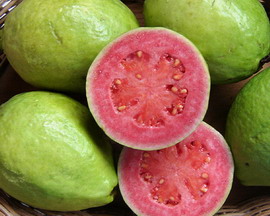Women Healthy -

Guava, the familiar magical fruit in our life, have multiple health benefits. The fruit is very rich in vitamin C and some minerals that can counteract many degenerative diseases, as well as maintaining physical fitness. The leaves and bark contains antibacterial substances that can cure several diseases.

Guava tree is branched plant shrubs. Parts of this plant are often used for various purposes are bark, leaves, and fruit.
Utilization of bark and leaves in the health field has a long history and still continues to this day. Guava leaves are often used for the treatment of diarrhea, gastroenteritis, and other complaints related to digestion.
Guava leaf is rich in flavonoids, especially quercetin. These compounds have antibacterial activity and contributing to the antidiarrheal effects. Polyphenols found in the leaves is known to have antioxidant activity.
Just like guava leaves, bark of this plant has antibacterial activity. Extracts from both parts of this plant are toxic in vitro against some bacteria that cause diarrhea, such as Staphylococcus, Salmonella, Shigella, Bacillus, Escherichia coli, Clostridium, and Pseudomonas.
The most important part of the guava plant, are fruit. Guava fruit can be consumed in the form of fresh or processed into various products such as jam, jelly, pasta, and juices.
Guava fruit is said to be very special because it has a high content of nutrients, such as vitamin C, potassium, and iron. In addition, it is also rich in non-nutritional substances such as dietary fiber, components carotenoids, and polyphenols. Guava fruit is free from saturated fatty acids and sodium, low fat and energy, but high in dietary fiber.
Vitamin C content of guava fruit is about 87 mg, twice that than sweet orange (49 mg/100 g), five times higher than orange, as well as eight times, than lemon (10.5 mg/100 g). Compared guava, levels of vitamin C in guava is far greater, that is 17 times higher than water guava (5 mg/100 g)
Health Benefits of Guava
1. Treating Dysentery
Guava is rich in astringents (compounds that make gums feel tighter and fresh after chewing guava leaves or eat raw guava). The content in guava astringent alkaline and have disinfectant and anti-bacterial capabilities, thus help cure dysentery by microbial slime formation by inhibiting the activity of mucus than dysentery-causing bacteria in the gut.
2. Heart Health
Fresh Guava is very rich in potassium, even more than bananas per 100 g of fruit weight. Potassium is an important component than cell and body fluids that helps control heart rate and blood pressure.
3. Healthy Brain Function
Vitamin B on guava health plays an important role in brain function. Guava is rich in vitamin B3 and B6. Vitamin B3, also known as niacin which serves to stimulate brain function and improve blood flow, and vitamin B6, also known as pyridoxine, is an important nutrient for brain and nerve function.
5. Treating coughs and colds
Perhaps there are few who know that guava useful for treating coughs and colds. Its use is still raw fruit by way of the juice. Raw guava juice or guava leaves really help relieve cough and cold by loosening respiratory tract disinfectant throat, reducing mucus, breathing and lungs and inhibiting microbial activity.
6. Cancer prevention, anti-aging, and increase body resistance
Guava is low in calories and fat but contains essential vitamins among others, mineral, and antioxidant poly-phenolic compounds and flavonoids play an important role in cancer prevention, anti-aging, and increase endurance.
7. Healthy Skin
Studies show that lycopene in guava young can prevent skin damage than the effects of UV rays and provides protection from prostate cancer.
8. Sources of vitamin B complex
Guava is also a source of B-complex vitamins such as pantothenic acid, niacin, vitamin B6 (pyridoxine), vitamin E, and K, and minerals like magnesium, copper, and manganese. Manganese is used by the body as a co-factor for the antioxidant enzyme, superoxide dismutase. Copper is required in the production of red blood cells.
9. Helps treat dengue fever
Guava leaf extract can also increase the number of platelets in the blood. Platelet numbers will decline drastically in patients with dengue fever so easy bleeding. Further tests also prove that the guava leaf extract is not toxic at all (safe for consumption).
Nutrition Fact of Guava
The content of guava fruit (100 gr)
Calories 49 cal
Vitamin A 25 SI
Vitamin B1 0.02 mg
Vitamin C 87 mg
Calcium 14 mg
Hydrate Charcoal 12.2 grams
Phosphorus 28 mg
Iron 1.1 mg
Protein 0.9 mg
0.3 grams of fat
Water 86 grams.









